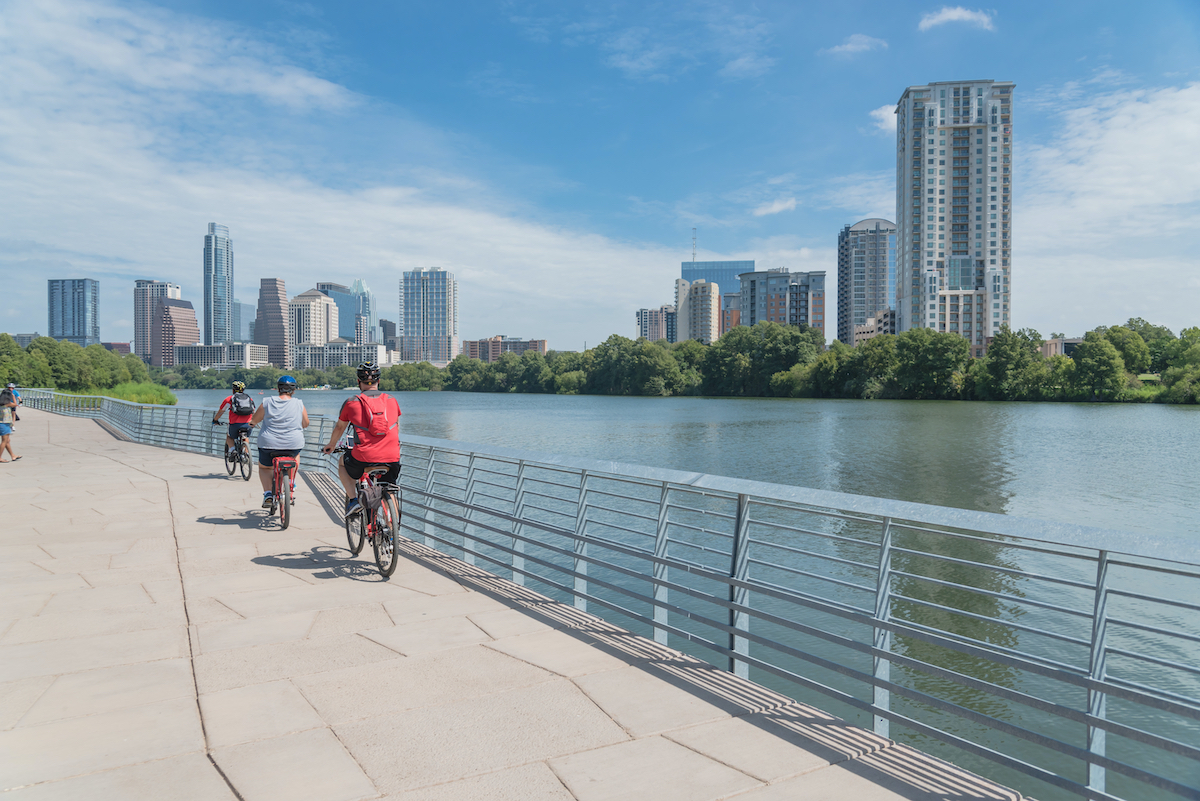What does creating Tree Equity in American cities actually look like? This fall, American Forests set out to answer this question. It turns out that every city has a different answer.
If you’ve followed any of our urban forestry work, you probably know that trees play an essential role in enhancing the physical, mental and economic health and well-being of communities. Trees cool the air and reduce the impact of severe heat, improve air quality and reduce flooding. If you heard about the launch of American Forests’ Tree Equity Score applications this summer, you might also know that our analysis of 486 urbanized neighborhoods in the Tree Equity Score National Explorer app revealed a disturbing national trend: Communities of color and neighborhoods with high concentrations of poverty tend to have fewer trees. As a changing climate brings more severe weather, how will your city or town ensure that the most vulnerable, not just the wealthy, benefit from the protection trees provide?

Photo Credit: Shutterstock / Trong Nguyen
In October 2021, municipal staff and organizations from 12 U.S. cities attended American Forests’ Tree Equity Learning Lab, a workshop aimed at answering that question. Participating cities included Austin, Texas; Baltimore; Boise, Idaho; Columbus, Ohio; Detroit; Dallas; Denver; Madison, Wis.; Minneapolis; Phoenix; Pittsburgh; and Richmond, Va. Nearly 100 people were organized into city teams to apply the Tree Equity Score National Explorer app (TES National Explorer) to their unique urban forestry goals. The tool generates Tree Equity scores at the municipal and neighborhood scale, incorporating interactive filters that help users identify priority areas based on neighborhood conditions, such as higher temperatures than the citywide average, poorer health outcomes or higher concentrations of seniors who are more vulnerable to the impacts of climate change.
The virtual convening marked a unique opportunity for cities to work with American Forests’ staff and partners to gain a deeper understanding of their scores and to start tackling some of their biggest urban forestry challenges. One of the participating city teams expressed concerns that tree removal is eating up too much of the urban forestry budget. The team felt that adopting the TES National Explorer as a standard could lead to better budgeting that supports tree maintenance and equitable canopy growth. Another participating city expressed that the app provides a unified approach for tree-planting prioritization at the city level — an opportunity to encourage more cross-department collaboration.
During community engagement sessions, where participants could share best practices across cities, participants learned strategies for expanding tree cover into private residential properties with high concentrations of renters. In his presentation on community engagement, Leandro Castro of Groundwork Rhode Island shared how the organization is working with housing organizations to develop stewardship agreements between renters and landlords that can help them overcome some of the barriers to planting trees on rental property. While many cities experience funding and capacity hurdles, the Learning Lab revealed that no two cities are identical in their approach to addressing these challenges. However, Tree Equity scores can serve as the foundation for developing most municipal Tree Equity strategies.
The power of tools, like the free and accessible TES National Explorer, come from how they are used. American Forests is committed to making sure our Tree Equity tools and resources support bold and creative action. The 2021 Tree Equity Learning Lab marks our transition from the development of the Tree Equity Score applications to the implementation phase of our Tree Equity work. We plan to continue engaging with the Learning Lab participants in a variety of ways. For example, we will offer past participants exclusive access to a webinar series covering a range of topics that will assist them in advancing their Tree Equity goals. Topics will likely include policy and funding, best practices for community engagement, how to use the Climate and Health Action Guide and Adaptation Menu, and demonstrations of the Tree Equity Score Analyzer — our deep-dive Tree Equity Score app that is customized for each city. Stay tuned for updates on the Tree Equity journey of the participating cities, and in the coming months look out for opportunities for your city to participate in American Forests events.
Acknowledgements:
The Tree Equity Learning Lab was supported by the Doris Duke Charitable Foundation. We’d also like to acknowledge our partners who provided their expertise during the Learning Lab, including the U.S. Forest Service’s Northern Institute of Applied Climate Science, Christine Carmichael, Ph.D., of Fair Forests Consulting, LLC, Groundwork Rhode Island, City Forest Credits and Quantified Ventures.